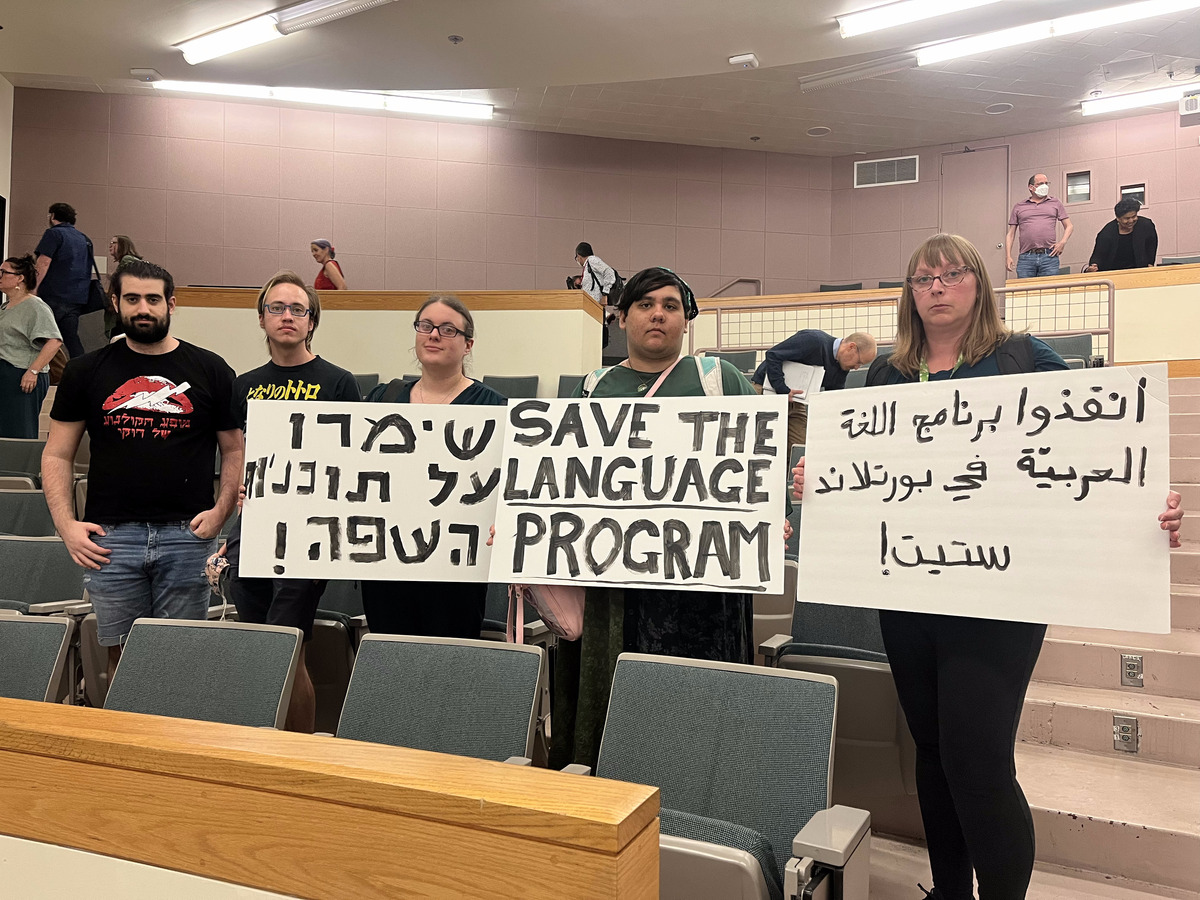Vanguard: “Do you still believe in transparency as a Board?”
Board Chair Gale Castillo: “I don’t know if I want to answer questions in the middle of a Board meeting. We do believe in transparency. It’s been the basis of our operations since we’ve begun.”
—–
Time and time again, when seeking answers from the university, student media encounters roadblocks and half-truths. Our experience has revealed that Portland State’s commitment is to its own narrative of greatness first and foremost, with a commitment to transparency and truth as more of an afterthought.
In correspondence with University Communications, student reporters are often given the run-around when it comes to asking critical questions about university affairs. It is not uncommon to receive a “We will get back to you,” or “I’ve still not gotten an answer to your inquiry yet” when asking about campus security committees or the former president’s payout.
In fact, during the winter term student media press conference with former President Rahmat Shoureshi, UComm told Vanguard it was not allowed to livestream the event because they had not been given enough time to “prepare.” Prior to that, a Vanguard editor was even asked to “consider tweaking a headline” by UComm.
At open comment periods, student reporters are told that Board meetings are not the appropriate setting to ask questions. Students and student reporters are meant to be satisfied with the one-sided exchange with the Board: the Board can seek direct comment from the public, but the public cannot seek direct comment from the Board.
If students and student reporters are not meant to ask questions at open comment periods, then this only leaves two other means of getting answers from the Board. First, one could send them an electronic message through a form on the Board’s website. Second, one could email UComm, who will then forward the message to members of the Board, and relay that message back.
Email communications allow the Board and UComm as much time as they’d like to form the perfect response. It removes all authenticity, spontaneity and genuineness from the interaction. Is it reasonable to expect a student body to trust a Board that insists on methods of communication this sterile and this filtered? This isn’t how a university that is committed to transparency should behave.
The President is not a Crook!
Nothing demonstrates this point more clearly than how the university controlled and stifled the flow of information during the recent presidential scandal. Since the moment the first article in The Oregonian came out—exposing serious allegations of misconduct from Shoureshi—the university has done its best to keep the scandal under wraps.
In a letter sent out to faculty and staff, Shoureshi denied the allegations: “Unfortunately, [the Oregonian] article also contained errors and misleading comments. The Board of Trustees has wisely undertaken a full review of the facts, and I am committed to cooperating fully with this effort.” Unfortunately, this letter was not sent to students who might have been confused about the very public condemnation of their university president.
Vanguard was made aware of this letter because UComm had mistakenly forwarded the letter to one of our news editors. We published it because we believe students should be kept informed. UComm stated the letter was not sent to students because they “have not gotten any questions from them so far.”
The Board then held a series of confidential meetings. Only members of the media were permitted to attend and only on the condition that no information from the meetings would be published. Part of these meetings was a discussion of the official investigative report of all of the allegations of misconduct against Shoureshi. As part of Shoureshi’s contract, this investigative report will never see the light of day. Castillo stated that “part of the agreement we reached with the former president includes the reports. So we’re really not allowed to discuss the reports in public according to the agreement.”
Finally, Shoureshi announced May 10 his decision to resign. In the letter sent out to faculty and students, the Board attempted to obfuscate the scandal by praising his many achievements. The letter read like a glowing review of all that Shoureshi had done in his short 21 months at PSU:
…Under Dr. Shoureshi’s leadership, the university has made significant strides. During his tenure, PSU launched a $300 million fund-raising campaign and raised more than $66 million to support students, faculty and programs. PSU also expanded its global reach by promoting new partnerships with universities in China and Saudi Arabia, launched the Harold Schnitzer Visiting Scholar Program and developed vision and goals for PSU to attain by 2025…
The underlying message to students reads something like this: Shoureshi was a good guy! What scandal? Just focus on all the good this university is doing! Apparently, students are expected to believe their president simply left his post because “the time has come for [him] to focus on [his] family first,” according to a letter he sent out to students.
This letter did not clear up any confusion that students might have had about the presidential scandal. It didn’t mention whether The Oregonian’s allegations of money mismanagement, workplace harassment or Shoureshi’s deleted emails were true or false. It doesn’t say how the Board is going to try to avoid situations like this in the future.
The Board also has not explained how a school facing an 11% tuition increase can afford a $880,000 payout to Shoureshi, or his paid leave or his extended health insurance. In the May 13 Board meeting, Vanguard asked the Board if this payout would affect the rising tuition costs, to which Board Chair Gale Castillo said it would not. When asked where the money would come from, Castillo replied: “This is an open comment period. If you want to talk to University Communications and conduct an interview there, that would be more appropriate. I’m not going to conduct an interview here.”
When a Vanguard reporter asked the Board to confirm if they had asked Shoureshi to resign, Castillo said: “I’m going to tell you the same thing I told the other [reporter]; I’m not going to conduct an interview here. If you would like to talk to University Communications you’re welcome to do so.”
Again, how can a Board claim to be transparent when they insist on using UComm—the public relations wing of the university of which its purpose is to make this university look good—as a mouthpiece?
Student concerns
Did the presidential scandal not affect students? Students pay tuition to attend this institution. It stands to reason that students care about the reputation of this school, they care about whether their president acts in an ethical manner and they care about how their Board of Trustees deals with instances of misconduct on this level.
On many occasions, members of the Vanguard editorial team have been approached by students confused by what is happening on this campus. They are confused about what it means to be at risk for accreditation, why our school is facing massive tuition hikes and what is going on with our leadership.
Kaitlyn Dey, a student and member of PSU Student Union, also finds challenges in communicating with the Board: “It’s extremely difficult, and I would say we’ve never really had any kind of dialogue with the Board that’s direct,” Dey said. “It’s always through public comment for the most part…we have a had a few Board members approach us [during a meeting break] and kind of talk to us, but I’ve noticed that those conversations don’t really go anywhere.”
The question of disarmament of campus police has been an important subject on campus since the death of Jason Washington last year. Since then, PSUSU has been seeking information from the Board.
Dey testified before the Board during open comment at the May 13 Board of Trustees meeting, reminding them that the student union has not given up on its efforts to disarm campus police.
“We feel there hasn’t been a lot of transparency with the Board of Trustees going forward with the process of determining campus public safety policy. I realize there is a committee that has been set up but there hasn’t been any public acknowledgement of that…We do not have any information about what has happened in those meetings.”
Indeed, the committee in charge of evaluating and producing recommendations from the Margolis Healy report holds private meetings, takes no minutes and will not share their findings publicly until the June 20 Board meeting—a meeting which is scheduled for the week after finals, when many students will be returning home for the summer, graduating or otherwise disconnected from campus.
When Vanguard reached out to UComm for an explanation as to why this committee holds its meetings in private, we did not get any answers. After a week of waiting, “I am still looking into your request” is all the information we have received on that.
“It’s not super surprising,” Dey said. “We expected more considering Margolis Healy’s report said one of the big issues was that [the university] is not communicating properly and there’s no transparency. The process is really bad and there’s a lot of mistrust. What they should have been doing is making sure it was a more open process that was actually involving students.”
Fortunately, after months of frustration and a lack of communication, Dey and one other PSUSU member did end up securing seats on the committee, which will continue to meet once a week until June 20.
However, this success is hardly a glowing review of Board transparency. We still don’t know why this committee is secret. Students still don’t have any updates or information from the Board as to what steps they are taking toward resolving the question of armament on campus.
What do we want from the Board?
We want transparency from the Board in the form of direct communication. Student reporters should be afforded the opportunity to get clear, honest answers from the Board in a face-to-face setting. Limiting communications to email and digital communications—filtered through UComm—is not good enough.
The lack of communication regarding the presidential scandal, campus safety and student media inquiries among other issues is an insult to the most important stakeholders a university has: the students. The way these scandals were dealt with is a disappointing demonstration of transparency, a value to which Castillo herself explicitly said the Board was committed.
Set up a press conference with student media. Host an open forum with your most important stakeholders—students—and answer our questions honestly.
Vanguard’s purpose is to seek truth and report it. Without the cooperation, honesty and transparency of our campus leaders, we all remain in the dark.
Anamika Vaughan contributed to this report.






